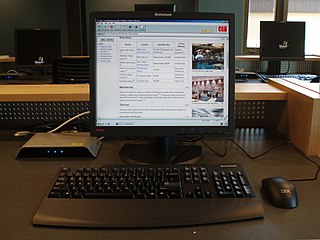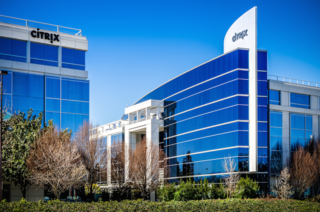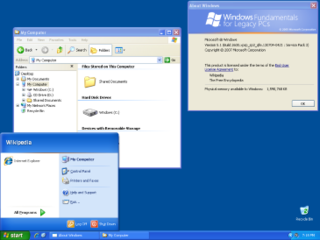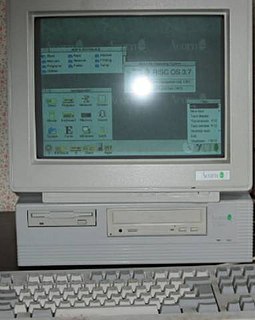Related Research Articles

In computer networking, a thin client is a simple (low-performance) computer that has been optimized for establishing a remote connection with a server-based computing environment. The server does most of the work, which can include launching software programs, performing calculations, and storing data. This contrasts with a fat client or a conventional personal computer; the former is also intended for working in a client–server model but has significant local processing power, while the latter aims to perform its function mostly locally.
Acorn Computers Ltd. was a British computer company established in Cambridge, England, in 1978. The company produced a number of computers which were especially popular in the UK, including the Acorn Electron and the Acorn Archimedes. Acorn's BBC Micro computer dominated the UK educational computer market during the 1980s.

The RiscPC was Acorn Computers's next generation RISC OS/Acorn RISC Machine computer, launched on 15 April 1994, which superseded the Acorn Archimedes. The Acorn PC card and software allows PC compatible software to be run.

Sibelius is a scorewriter program developed and released by Sibelius Software Limited. It is the world's largest selling music notation program. Beyond creating, editing and printing music scores, Sibelius can also play the music back using sampled or synthesised sounds. It produces printed scores, and can also publish them via the Internet for others to access. Less advanced versions of Sibelius at lower prices have been released, as have various add-ons for the software.

The Phoebe 2100 was to be Acorn Computers' successor to the RiscPC, slated for release in late 1998. However, in September 1998 Acorn cancelled the project as part of a restructuring of the company.

Citrix Systems, Inc. is an American multinational software company that provides server, application and desktop virtualization, networking, software as a service (SaaS), and cloud computing technologies. Citrix products are claimed to be in use by over 400,000 clients worldwide, including 99% of the Fortune 100, and 98% of the Fortune 500.
The Network Computer was a diskless desktop computer device made by Oracle Corporation from about 1996 to 2000. The devices were designed and manufactured by an alliance, which included Sun Microsystems, IBM, and others. The devices were designed with minimum specifications, based on the Network Computer Reference Profile. The brand was also employed as a marketing term to try to popularize this design of computer within enterprise and among consumers.
Independent Computing Architecture (ICA) is a proprietary protocol for an application server system, designed by Citrix Systems. The protocol lays down a specification for passing data between server and clients, but is not bound to any one platform. Citrix's ICA is an alternative to Microsoft's Remote Desktop Protocol (RDP).

Hermann Maria Hauser, KBE, FRS, FREng, FInstP, CPhys is an Austrian-born entrepreneur who is primarily associated with the Cambridge technology community in England.

A diskless node is a workstation or personal computer without disk drives, which employs network booting to load its operating system from a server.

The Acorn Network Computer was a network computer designed and manufactured by Acorn Computers Ltd. It was the implementation of the Network Computer Reference Profile that Oracle Corporation commissioned Acorn to specify for network computers. Sophie Wilson of Acorn led the effort. It was launched in August 1996.

Windows Fundamentals for Legacy PCs ("WinFLP") is a thin client operating system from Microsoft, based on Windows XP Embedded and is optimized for older, less powerful hardware. It was released on July 8, 2006 and is not marketed as a full-fledged general purpose operating system, although it is functionally able to perform most of the tasks generally associated with one. It includes only certain functionality for local workloads such as security, management, document viewing related tasks and the .NET Framework. It is designed to work as a client–server solution with RDP clients or other third party clients such as Citrix ICA.
Desktop virtualization is a software technology that separates the desktop environment and associated application software from the physical client device that is used to access it.
In computing, the term remote desktop refers to a software or operating system feature that allows a personal computer's desktop environment to be run remotely on one system, while being displayed on a separate client device. Remote desktop applications have varying features. Some allow attaching to an existing user's session and "remote controlling", either displaying the remote control session or blanking the screen. Taking over a desktop remotely is a form of remote administration.
Remote Desktop Services (RDS), known as Terminal Services in Windows Server 2008 and earlier, is one of the components of Microsoft Windows that allow a user to take control of a remote computer or virtual machine over a network connection. RDS is Microsoft's implementation of thin client architecture, where Windows software, and the entire desktop of the computer running RDS, are made accessible to any remote client machine that supports Remote Desktop Protocol (RDP). User interfaces are displayed from the server onto the client system and input from the client system is transmitted to the server - where software execution takes place. This is in contrast to application streaming systems, like Microsoft App-V, in which computer programs are streamed to the client on-demand and executed on the client machine.
Pano Logic was a manufacturer of devices which present virtual desktops to the end user with no local processing power. They describe this concept as "zero client". This is perceived as offering benefits in end-user support and in power provision to desks. OEM versions have been included in displays from some vendors, allowing a single unit to be deployed. The company failed in October 2012. In March 2013, Propalms announced they had acquired the rights to support Panologic customers, and will "help transition the customer base to a new platform".

The A7000 and A7000+ were Acorn Computers' entry level computers based on the RiscPC architecture. Launched in 1995, they replaced some of the models of the Acorn Archimedes range. After the breakup of Acorn Computers in 1998, Castle Technology bought the rights to continue production of the A7000+. The A7000 used the ARM7500 system on chip which combined the separate ARM CPU, MMU, VIDC20 video chip and IOMD IO controller of the RiscPC into a single chip.

Wyse is an American manufacturer of cloud computing systems. They are best known for their video terminal line introduced in the 1980s, which competed with the market leading Digital. They also had a successful line of IBM PC compatible workstations in the mid-to-late 1980s, but were outcompeted by companies such as Dell starting late in the decade. Current products include thin client hardware and software as well as desktop virtualization solutions. Other products include cloud software-supporting desktop computers, laptops, and mobile devices. Dell Cloud Client Computing is partnered with IT vendors such as Citrix, IBM, Microsoft, and VMware.
RISC OS, the computer operating system developed by Acorn Computers for their ARM-based Acorn Archimedes range, was originally released in 1987 as Arthur 0.20, soon followed by Arthur 0.30, and Arthur 1.20. The next version, Arthur 2, became RISC OS 2 and was completed and made available in April 1989. RISC OS 3 was released with the very earliest version of the A5000 in 1991 and contained a series of new features. By 1996 RISC OS had been shipped on over 500,000 systems.
Citrix Virtual Apps is application virtualization software produced by Citrix Systems that allows Windows applications to be accessed via individual devices from a shared server or cloud system.
References
- ↑ "Net.Nieuws juli '98". Big Ben Club website. Big Ben Club. July 1998. Retrieved 10 March 2014.
- ↑ "STB/NC". ANS website. Acorn News Service. 19 September 1998. Retrieved 10 March 2014.
- ↑ Whytehead, Chris. "Acorn DeskLite". Chris's Acorns. Retrieved 10 March 2014.
- ↑ Booth, Simon (30 August 1998). "Schema Initial Evaluation of System" (PDF). Report on the Implementation of Network Computers. Centre for Research and Development in Learning Technology. p. 14. Retrieved 10 March 2014.
- ↑ "Network Computing". Archive . August 1998. Retrieved 10 March 2014.
- ↑ "Network Computing". Archive . November 1998. Retrieved 10 March 2014.
- ↑ Saran, Cliff (25 June 1998). "PC & desktop Suppliers spy opening in terminals market". Computer Weekly . Archived from the original on 10 March 2014. Retrieved 10 March 2014.
- ↑ Investors Chronicle. 125. Financial Times Business Pub. 1998. p. 273.
- ↑ "Acorn Group Announces World-first With $199 Thin-client Terminal Technology; Acorn Group Has Technology for Client with Citrix ICA Architecture". Business Wire . 16 June 1998. Retrieved 10 March 2014.
- ↑ "Acorn, Boca launch DeskLite thin-client". telecompaper. 8 September 1998. Retrieved 10 March 2014.
- ↑ "Cirrus Logic's ARM-Based System-On-Chip Solutions Continue to Gain Momentum". Cirrus Logic website. Cirrus Logic. 22 June 1998. Retrieved 10 March 2014.
- ↑ "Acorn DeskLite design offers sub $200 terminals". CBR online. 15 June 1998.